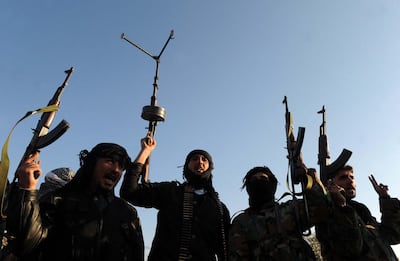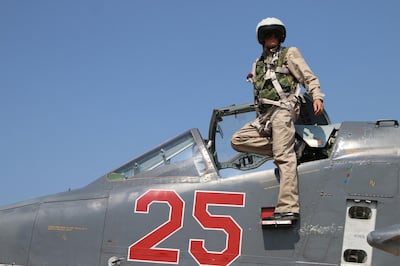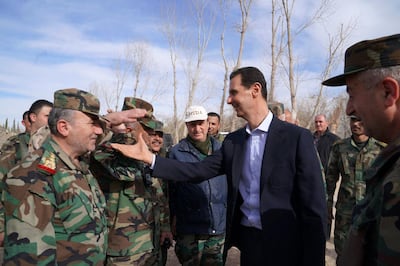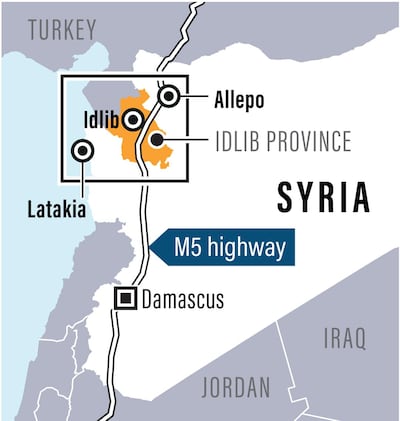It has been 10 years since the start of the war in Syria, but the conflict grinds on with little sign of ending.
Even if the regime of Bashar Al Assad, who has often portrayed himself as a bastion of resistance against the imperialist West, manages to retake Idlib province – the last stronghold of Syria's rebels – the country is now in ruins and bogged down in economic misery.
More than 300,000 people have died and 11 million have been displaced. Many other casualties remain undocumented.
The war's intensity has been driven by the growing realisation among the opposing sides that defeat means near-certain death.
Foreign powers spent the conflict's first few years lavishing money, weapons and mercenaries on their chosen side.
Mr Al Assad has succeeded in recapturing most of the major cities and provinces he lost during the war.
But he presides over a damaged, depopulated country that will be suffering for many years to come. Reconstruction will cost hundreds of billions of dollars.
To many observers, the war may seem like a long blur of violence and suffering but some pivotal events stand out:
2011: peaceful protests met with regime gunfire
In early 2011, Syrians scrawled "Your turn, doctor!” on walls in the southern city of Deraa. A reference to Mr Al Assad, who is a qualified ophthalmologist, the slogan was inspired by anti-regime uprisings in Tunisia, Libya and Egypt. Syria's regime detained the children responsible and tortured them. Anti-regime protests spread across the country with demonstrators demanding that Mr Al Assad step down. The regime responded with mass arrests, kidnappings and increasingly, gunfire.
2012: opposition takes up arms
Although the first clashes between government forces and opposition groups began as early as the summer of 2011, sustained violence resembling a civil war did not start until 2012 when cities such as Hama came under sustained artillery bombardment. The Free Syrian Army, formed by regime defectors, soon found itself among a collection of different allied factions, many of them with extremist sympathies. Backed by regional powers, these groups started seizing vital cities that were left largely undefended by government forces.
By mid-2012, the regime’s aircraft started dropping barrels laden with explosives on its own people in rebel-held areas, supplementing this devastating bombardment with heavy artillery attacks.
2013: Iran and Lebanon’s Hezbollah defend Assad
As regime forces came under increasing pressure – a number of army bases fell to the rebels in the rural north in late 2012 and early 2013, Lebanon’s Hezbollah openly sent its fighters to support Mr Al Assad.
The Islamic Revolutionary Guard Corps also sent advisers and – reportedly – weaponry to support its beleaguered ally.
But it wasn't just the rural north and east where the rebels were gaining ground. Fighting soon raged in the suburbs of Damascus, where the regime was just as violent in its methods as it was in cities such as Hama, Homs and Aleppo.
UN inspectors confirmed that the nerve agent sarin was used in an attack on the Ghouta agricultural belt around Damascus in August 2013.
Former US president Barack Obama put military action against the Assad regime on hold and vowed to pursue diplomacy to remove the government's chemical weapons.
2014: the rise of ISIS
In June 2014, ISIS announced it controlled a vast area of Syrian territory, with Raqqa as its capital.
The US and its allies in the West and the wider region shifted focus from removing Mr Al Assad to fighting the extremists of ISIS, although the Al Qaeda-linked Jabhat Al Nusra came to dominate Idlib province.
By 2014, ISIS had seized territory in Syria and Iraq and proclaimed a so-called caliphate.
It survived on oil sales, kidnappings, robbery and extortion, as well as illicit financial transfers from wealthy foreign donors. Slowly, international efforts worked to close down these channels of funding.
2015: Russia changes the conflict
In September 2015, Russia sent weapons, military advisers and mercenaries to prop up Mr Al Assad's Iran-backed government forces. The Russian intervention, bringing heavy firepower to back up the regime's crumbling air force, was a game changer. But it led to another huge wave of refugees.
Russia’s infamous air strikes bombed entire cities flat, often using the double-tap technique, where the first air strike hits and a second one follows within minutes to kill whomever comes to the rescue.
In 2015, an image of a Syrian Kurdish boy called Alan Kurdi lying face down on a Turkish beach after a boat capsized in the Mediterranean highlighted the Syrian refugee crisis. Millions took the deadly sea route between Turkey and Greece in a desperate attempt to reach Europe. The war forced half of Syria’s prewar population of nearly 22 million to flee their homes within the country or go further afield, with millions pouring into Europe, Turkey, Lebanon, Jordan and Egypt.
2016: chlorine gas
Syrian rebels and activists accused the regime of using chlorine in gas attacks on Aleppo after graphic footage emerged on social media of people with severe breathing difficulties.
The UN said a chlorine attack would amount to a war crime.
2017: US military strikes after chemical weapons used again
Chemical weapons were used in the strategic northern city of Khan Sheikhoun in April 2017, which UN experts blamed on the Syrian government.
Up to 100 civilians were thought to have died and the attack prompted military strikes by the Donald Trump administration.
But for the rebellion, which by now was riven with extremist infighting and pounded by Russian air strikes, there was little hope left. This did not stop increasing involvement from Turkey, Russia and Iran.
The conflict continued to spiral out of control, with Russian and Turkish forces clashing, Israeli air strikes hitting Syrian forces and even clashes between Shiite militias and US forces. In May 2017 for example, Turkey threatened to bomb US forces who were embedded with allied Syrian Kurdish fighters in the campaign against ISIS.
Fearing uncontrollable conflict, Russia and Turkey reached a de-escalation agreement in flashpoints, including the strategically important Idlib province which is on the border with Turkey.
2018: regime controls most of the country
Russian air power helped the regime regain control over most of the country. By mid-2018, the regime retook major cities and areas, chiefly Aleppo and large patches of the countryside and suburbs of Damascus, and then Deraa, known as the cradle of the Syrian revolution.
Russia and Turkey reached an agreement in September 2018 to avert a full-scale regime operation to recapture Idlib. The Sochi accord called for a 25-kilometre demilitarised buffer zone. The rebel factions were required to pull their heavy weapons out of the zone, and extremists in the province, like Al Qaeda-linked Hayat Tahrir Al Sham were told to withdraw altogether from the zone.
2019: the defeat of ISIS
The Kurdish-led and US-backed Syrian Democratic Forces declared the self-proclaimed ISIS "caliphate" defeated after the militants' capitulation in their last stronghold, the eastern village of Baghouz. The US, however, still believes that the extremist group has many sleeper cells in Syria and elsewhere in the Middle East.
Throughout the years of the conflict, there were several peace initiatives, backed at various points by the UN, the US and Russia in cities like Geneva and Astana, the Kazakh capital, and Sochi in Russia. But all these peace efforts have failed to stop the killings, torture, bombings and displacement.
Syrian opposition forces withdrew from the strategic town of Khan Sheikhoun, deep in Idlib. The city lies along the M5 road, which is the main motorway through Syria from north to south, linking Damascus, Homs and Aleppo.
2020: the battle for Idlib continues
Despite the Covid-19 pandemic, government air strikes and ground operations continued in 2020, driving almost a million civilians from their homes in Idlib province since December.
The UN says this is the biggest single displacement of Syria’s 10-year war and has warned that a full-scale battle – promised by the regime to recapture Idlib – could result in a new bloodbath.
The National's picks
4.35pm: Tilal Al Khalediah
5.10pm: Continous
5.45pm: Raging Torrent
6.20pm: West Acre
7pm: Flood Zone
7.40pm: Straight No Chaser
8.15pm: Romantic Warrior
8.50pm: Calandogan
9.30pm: Forever Young
Opening Rugby Championship fixtures: Games can be watched on OSN Sports
Saturday: Australia v New Zealand, Sydney, 1pm (UAE)
Sunday: South Africa v Argentina, Port Elizabeth, 11pm (UAE)
More from Neighbourhood Watch:
The five pillars of Islam
1. Fasting
2. Prayer
3. Hajj
4. Shahada
5. Zakat
Killing of Qassem Suleimani
Killing of Qassem Suleimani
Red flags
- Promises of high, fixed or 'guaranteed' returns.
- Unregulated structured products or complex investments often used to bypass traditional safeguards.
- Lack of clear information, vague language, no access to audited financials.
- Overseas companies targeting investors in other jurisdictions - this can make legal recovery difficult.
- Hard-selling tactics - creating urgency, offering 'exclusive' deals.
Courtesy: Carol Glynn, founder of Conscious Finance Coaching
Zayed Sustainability Prize
UAE currency: the story behind the money in your pockets
More on Quran memorisation:
SPEC%20SHEET%3A%20NOTHING%20PHONE%20(2)
%3Cp%3E%3Cstrong%3EDisplay%3A%3C%2Fstrong%3E%206.7%E2%80%9D%20LPTO%20Amoled%2C%202412%20x%201080%2C%20394ppi%2C%20HDR10%2B%2C%20Corning%20Gorilla%20Glass%3C%2Fp%3E%0A%3Cp%3E%3Cstrong%3EProcessor%3A%3C%2Fstrong%3E%20Qualcomm%20Snapdragon%208%2B%20Gen%202%2C%20octa-core%3B%20Adreno%20730%20GPU%3C%2Fp%3E%0A%3Cp%3E%3Cstrong%3EMemory%3A%3C%2Fstrong%3E%208%2F12GB%3C%2Fp%3E%0A%3Cp%3E%3Cstrong%3ECapacity%3A%3C%2Fstrong%3E%20128%2F256%2F512GB%3C%2Fp%3E%0A%3Cp%3E%3Cstrong%3EPlatform%3A%3C%2Fstrong%3E%20Android%2013%2C%20Nothing%20OS%202%3C%2Fp%3E%0A%3Cp%3E%3Cstrong%3EMain%20camera%3A%3C%2Fstrong%3E%20Dual%2050MP%20wide%2C%20f%2F1.9%20%2B%2050MP%20ultrawide%2C%20f%2F2.2%3B%20OIS%2C%20auto-focus%3C%2Fp%3E%0A%3Cp%3E%3Cstrong%3EMain%20camera%20video%3A%3C%2Fstrong%3E%204K%20%40%2030%2F60fps%2C%201080p%20%40%2030%2F60fps%3B%20live%20HDR%2C%20OIS%3C%2Fp%3E%0A%3Cp%3E%3Cstrong%3EFront%20camera%3A%3C%2Fstrong%3E%2032MP%20wide%2C%20f%2F2.5%2C%20HDR%3C%2Fp%3E%0A%3Cp%3E%3Cstrong%3EFront%20camera%20video%3A%3C%2Fstrong%3E%20Full-HD%20%40%2030fps%3C%2Fp%3E%0A%3Cp%3E%3Cstrong%3EBattery%3A%3C%2Fstrong%3E%204700mAh%3B%20full%20charge%20in%2055m%20w%2F%2045w%20charger%3B%20Qi%20wireless%2C%20dual%20charging%3C%2Fp%3E%0A%3Cp%3E%3Cstrong%3EConnectivity%3A%3C%2Fstrong%3E%20Wi-Fi%2C%20Bluetooth%205.3%2C%20NFC%20(Google%20Pay)%3C%2Fp%3E%0A%3Cp%3E%3Cstrong%3EBiometrics%3A%3C%2Fstrong%3E%20Fingerprint%2C%20face%20unlock%3C%2Fp%3E%0A%3Cp%3E%3Cstrong%3EI%2FO%3A%3C%2Fstrong%3E%20USB-C%3C%2Fp%3E%0A%3Cp%3E%3Cstrong%3EDurability%3A%3C%2Fstrong%3E%20IP54%2C%20limited%20protection%3C%2Fp%3E%0A%3Cp%3E%3Cstrong%3ECards%3A%3C%2Fstrong%3E%20Dual-nano%20SIM%3C%2Fp%3E%0A%3Cp%3E%3Cstrong%3EColours%3A%3C%2Fstrong%3E%20Dark%20grey%2C%20white%3C%2Fp%3E%0A%3Cp%3E%3Cstrong%3EIn%20the%20box%3A%3C%2Fstrong%3E%20Nothing%20Phone%20(2)%2C%20USB-C-to-USB-C%20cable%3C%2Fp%3E%0A%3Cp%3E%3Cstrong%3EPrice%20(UAE)%3A%3C%2Fstrong%3E%20Dh2%2C499%20(12GB%2F256GB)%20%2F%20Dh2%2C799%20(12GB%2F512GB)%3C%2Fp%3E%0A
UAE currency: the story behind the money in your pockets
The five pillars of Islam
The Voice of Hind Rajab
Starring: Saja Kilani, Clara Khoury, Motaz Malhees
Director: Kaouther Ben Hania
Rating: 4/5
A Cat, A Man, and Two Women
Junichiro Tamizaki
Translated by Paul McCarthy
Daunt Books
KILLING OF QASSEM SULEIMANI
THE TWIN BIO
Their favourite city: Dubai
Their favourite food: Khaleeji
Their favourite past-time : walking on the beach
Their favorite quote: ‘we rise by lifting others’ by Robert Ingersoll
Guardians%20of%20the%20Galaxy%20Vol%203
%3Cp%3E%3Cstrong%3EDirector%3A%20%3C%2Fstrong%3EJames%20Gunn%3C%2Fp%3E%0A%3Cp%3E%3Cstrong%3EStars%3A%3C%2Fstrong%3E%20Chris%20Pratt%2C%20Zoe%20Saldana%2C%20Dave%20Bautista%2C%20Vin%20Diesel%2C%20Bradley%20Cooper%3C%2Fp%3E%0A%3Cp%3E%3Cstrong%3ERating%3A%3C%2Fstrong%3E%204%2F5%3C%2Fp%3E%0A
THE BIO
Age: 33
Favourite quote: “If you’re going through hell, keep going” Winston Churchill
Favourite breed of dog: All of them. I can’t possibly pick a favourite.
Favourite place in the UAE: The Stray Dogs Centre in Umm Al Quwain. It sounds predictable, but it honestly is my favourite place to spend time. Surrounded by hundreds of dogs that love you - what could possibly be better than that?
Favourite colour: All the colours that dogs come in
MATCH INFO
Uefa Champions League quarter-final (first-leg score):
Juventus (1) v Ajax (1), Tuesday, 11pm UAE
Match will be shown on BeIN Sports
What can you do?
Document everything immediately; including dates, times, locations and witnesses
Seek professional advice from a legal expert
You can report an incident to HR or an immediate supervisor
You can use the Ministry of Human Resources and Emiratisation’s dedicated hotline
In criminal cases, you can contact the police for additional support
AUSTRALIA SQUAD
Tim Paine (captain), Sean Abbott, Pat Cummins, Cameron Green, Marcus Harris, Josh Hazlewood, Travis Head, Moises Henriques, Marnus Labuschagne, Nathan Lyon, Michael Neser, James Pattinson, Will Pucovski, Steve Smith, Mitchell Starc, Mitchell Swepson, Matthew Wade, David Warner
Indoor cricket in a nutshell
Indoor cricket in a nutshell
Indoor Cricket World Cup - Sept 16-20, Insportz, Dubai
16 Indoor cricket matches are 16 overs per side
8 There are eight players per team
9 There have been nine Indoor Cricket World Cups for men. Australia have won every one.
5 Five runs are deducted from the score when a wickets falls
4 Batsmen bat in pairs, facing four overs per partnership
Scoring In indoor cricket, runs are scored by way of both physical and bonus runs. Physical runs are scored by both batsmen completing a run from one crease to the other. Bonus runs are scored when the ball hits a net in different zones, but only when at least one physical run is score.
Zones
A Front net, behind the striker and wicketkeeper: 0 runs
B Side nets, between the striker and halfway down the pitch: 1 run
C Side nets between halfway and the bowlers end: 2 runs
D Back net: 4 runs on the bounce, 6 runs on the full
Company%20profile
%3Cp%3E%3Cstrong%3ECompany%20name%3A%20%3C%2Fstrong%3EXare%C2%A0%3C%2Fp%3E%0A%3Cp%3E%3Cstrong%3EStarted%3A%20%3C%2Fstrong%3EJanuary%2018%2C%202021%C2%A0%3C%2Fp%3E%0A%3Cp%3E%3Cstrong%3EFounders%3A%20%3C%2Fstrong%3EPadmini%20Gupta%2C%20Milind%20Singh%2C%20Mandeep%20Singh%C2%A0%3C%2Fp%3E%0A%3Cp%3E%3Cstrong%3EBased%3A%20%3C%2Fstrong%3EDubai%C2%A0%3C%2Fp%3E%0A%3Cp%3E%3Cstrong%3ESector%3A%20%3C%2Fstrong%3EFinTech%C2%A0%3C%2Fp%3E%0A%3Cp%3E%3Cstrong%3EFunds%20Raised%3A%20%3C%2Fstrong%3E%2410%20million%C2%A0%3C%2Fp%3E%0A%3Cp%3E%3Cstrong%3ECurrent%20number%20of%20staff%3A%20%3C%2Fstrong%3E28%C2%A0%3C%2Fp%3E%0A%3Cp%3E%3Cstrong%3EInvestment%20stage%3A%20%3C%2Fstrong%3Eundisclosed%3C%2Fp%3E%0A%3Cp%3E%3Cstrong%3EInvestors%3A%20%3C%2Fstrong%3EMS%26amp%3BAD%20Ventures%2C%20Middle%20East%20Venture%20Partners%2C%20Astra%20Amco%2C%20the%20Dubai%20International%20Financial%20Centre%2C%20Fintech%20Fund%2C%20500%20Startups%2C%20Khwarizmi%20Ventures%2C%20and%20Phoenician%20Funds%3C%2Fp%3E%0A
Juventus v Napoli, Sunday, 10.45pm (UAE)
Match on Bein Sports
Mohammed bin Zayed Majlis
The specs
Engine: Long-range single or dual motor with 200kW or 400kW battery
Transmission: Single-speed automatic
Max touring range: 620km / 590km
Price: From Dh250,000 (estimated)
Mohammed bin Zayed Majlis
More from Neighbourhood Watch:
Our legal consultants
Name: Hassan Mohsen Elhais
Position: legal consultant with Al Rowaad Advocates and Legal Consultants.
Company Profile
Name: Thndr
Started: 2019
Co-founders: Ahmad Hammouda and Seif Amr
Sector: FinTech
Headquarters: Egypt
UAE base: Hub71, Abu Dhabi
Current number of staff: More than 150
Funds raised: $22 million
LUKA CHUPPI
Director: Laxman Utekar
Producer: Maddock Films, Jio Cinema
Cast: Kartik Aaryan, Kriti Sanon, Pankaj Tripathi, Vinay Pathak, Aparshakti Khurana
Rating: 3/5
The years Ramadan fell in May
More from Rashmee Roshan Lall
No%20Windmills%20in%20Basra
%3Cp%3EAuthor%3A%20Diaa%20Jubaili%3C%2Fp%3E%0A%3Cp%3EPages%3A%20180%3C%2Fp%3E%0A%3Cp%3EPublisher%3A%20Deep%20Vellum%20Publishing%C2%A0%3C%2Fp%3E%0A
ACL Elite (West) - fixtures
Monday, Sept 30
Al Sadd v Esteghlal (8pm)
Persepolis v Pakhtakor (8pm)
Al Wasl v Al Ahli (8pm)
Al Nassr v Al Rayyan (10pm)
Tuesday, Oct 1
Al Hilal v Al Shorta (10pm)
Al Gharafa v Al Ain (10pm)
More from Neighbourhood Watch:
Killing of Qassem Suleimani
Zayed Sustainability Prize
UAE currency: the story behind the money in your pockets
Company%20profile
%3Cp%3E%3Cstrong%3ECompany%3A%20%3C%2Fstrong%3ESplintr%3C%2Fp%3E%0A%3Cp%3E%3Cstrong%3EStarted%3A%20%3C%2Fstrong%3EMay%202019%3C%2Fp%3E%0A%3Cp%3E%3Cstrong%3EFounders%3A%20%3C%2Fstrong%3EMohammad%20AlMheiri%20and%20Badr%20AlBadr%3C%2Fp%3E%0A%3Cp%3E%3Cstrong%3EBased%3A%20%3C%2Fstrong%3EDubai%20and%20Riyadh%3C%2Fp%3E%0A%3Cp%3E%3Cstrong%3ESector%3A%20%3C%2Fstrong%3Epayments%20%2F%20FinTech%3C%2Fp%3E%0A%3Cp%3E%3Cstrong%3ESize%3A%20%3C%2Fstrong%3E10%20employees%3C%2Fp%3E%0A%3Cp%3E%3Cstrong%3EInitial%20investment%3A%20%3C%2Fstrong%3Eundisclosed%20seven-figure%20sum%20%2F%20pre-seed%3C%2Fp%3E%0A%3Cp%3E%3Cstrong%3EStage%3A%20%3C%2Fstrong%3Eseed%3C%2Fp%3E%0A%3Cp%3E%3Cstrong%3EInvestors%3A%20%3C%2Fstrong%3Eangel%20investors%3C%2Fp%3E%0A
Inside%20Out%202
%3Cp%3E%3Cstrong%3EDirector%3A%C2%A0%3C%2Fstrong%3EKelsey%20Mann%3C%2Fp%3E%0A%3Cp%3E%3Cstrong%3EStarring%3A%3C%2Fstrong%3E%C2%A0Amy%20Poehler%2C%20Maya%20Hawke%2C%20Ayo%20Edebiri%3C%2Fp%3E%0A%3Cp%3E%3Cstrong%3ERating%3A%20%3C%2Fstrong%3E4.5%2F5%3C%2Fp%3E%0A







